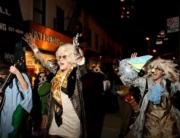
A certain perspective can shake consciences or highlight something that is wrong. Photography fills this role in capable hands and through the vision of an artist who knows not only when to click but why.
Photography as an art is an invitation to rediscover the world from another angle. The work of Letizia Battaglia, a Sicilian photographer born in 1935, serves as an example of the double function of photography as a political weapon and artistic tool. Her life and work were dedicated to understanding the problems of her country and exposing the evils that corrupted it, specifically the Mafia. Tracing the personal and public persona of Battaglia during a crucial time for Italy, the 1970s through the ‘90s, is the exact purpose behind this revelatory documentary directed by British filmmaker Kim Longinotto.
With vitality and clarity, the firsthand narration by Battaglia reveals how she became a photographer when it was something unthinkable for a young woman growing up in Palermo. After a failed marriage and a few romances that made her look licentious according to the morals of the time, Battaglia found a vocation that allowed her to break free from the only destiny for women in the region, wife and mother.
She was the first female photographer to be hired by an Italian newspaper when the Mafia, also known as La Cosa Nostra, controlled the economy and politics in the country. It didn’t take long for her work to cross paths with the consequences of the Mafia’s crimes. Her first photograph in the field records a dead body near the foot of an olive tree, guarded by a policeman standing still in the background. Her subsequent photos grow in concept and emotional depth, but that first image marked a point of no return for her professionally.
Interwoven throughout the documentary, her output captures raw emotions of pain and despair of mothers and widows affected by their lost in real time, without sentimentality or exploitation. Similar to her first photo, other images feature dead bodies in crime scenes before any police intervention. Those particular photos convey a rare beauty combined with the horror. However, Battaglia rejects the idea of her pictures as something beautiful, and they are enormously, in an eerie way. She even confesses she has fantasized about burning them all. As expected, her work was met with threats, and she felt constantly in danger of becoming the next fatality.
Although Battaglia’s photographs are Longinotto’s main focus, the filmmaker also has an interest in the personal life of her protagonist. The appearances of some ex-boyfriends, who remain close friends to Battaglia, illustrate tender and melancholic interactions, saddened by the impossibility of mending the past. “Love is a lie,” affirm Letizia, “because if it were real love it will last forever.”
The biographical sections are complemented with footage of 1950s Italian cinema and home movies, underlining the rebellious and romantic spirit of Battaglia. Often these moments create an irregular disconnection with the rest of the film, which focuses on Mafia’s crimes and the photographer’s political activism.
Her commitment to fighting against corruption and organized crime lead her to political figures like Giovanni Falcone. A substantial part of the film is centered on this magistrate, who was murdered in his pursuit of justice against the Mafia. This subject remains delicate for Battaglia, who still feels anger and frustration.
Shooting the Mafia reverently extols Battaglia’s bravery and provides an illuminating look at her work. It also has another function, to offer another viewpoint on a known subject. Considering how many times the Mafia has been represented in the history of cinema, comprising an entire genre by itself, we take for granted the damages caused by organized crime for everyday folk. Maybe the stories of its victims are not so glamorous as the charismatic “capos” and godfathers, but they deserve a proper close-up. Through her compassionate proximity to ordinary people, this is achieved in Battaglia’s photos, where their pain speaks louder than any words.






Leave A Comment